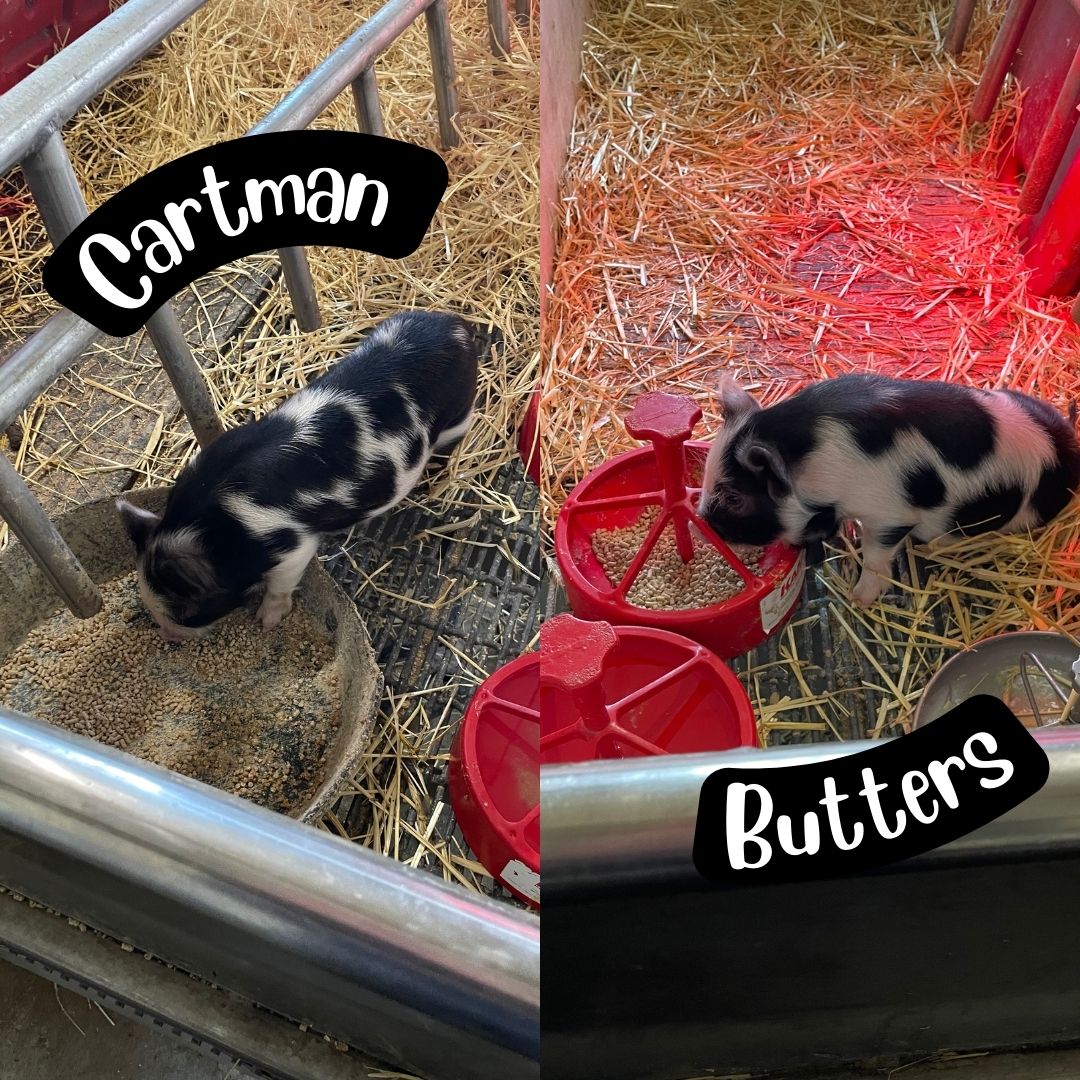New piglets join Peckham Farm, Cartman (left) and Butters (right). PHOTO CREDIT: David Broccoli | Entertainment Editor
Peckham Farm is now the home of two Kunekune pigs named Butters and Cartman.
Both piglets were born in the month of March and have gained a lot of popularity through a post made by the University of Rhode Island’s Instagram.
Coleman Replogle, farm manager of Peckham Farm, said that Kunekune pigs are from New Zealand, but Butters and Cartman were born on the farm.
“We brought in these types of pigs because they’re supposed to be very good with pasture-grazing,” Replogle said. “So, they have a shorter snout which means that they do not till the ground up as much. We’re trying to focus here on the farm with more pasture-based systems. So, cross-breeding Kunekune’s in with other conventional pigs that we already have might lead to something that’s a better pasture pig for us.”
Julie Bosland, a student graduating this semester with a Ph.D. in biological and environmental sciences with a concentration in sustainable agriculture and food systems, is taking over short-term as assistant farm manager. She talked more about the birth of the piglets and their mother, Marsha.
Marsha rejected them at birth and both piglets had to be bottle fed by a veterinarian at home, according to both Replogle and Bosland. They needed this because their mother didn’t want to care for them and they had to receive extra care when they were born.
“They did leave for the first two weeks after they were born,” Bosland said. “Once they got big enough, they came here and we’ve been still feeding them milk and food and stuff like that.”
Cartman will be staying on the farm and Butters will be leaving, according to both Replogle and Bosland.
Butters was bought by Jake Furigay, a student at URI majoring in animal science with a concentration in pre-veterinary studies. He renamed Butters to Benedict and will be living on a farm with him after graduating, according to Coleman.
Replogle explained that Furigay really loved Butters a lot, and so the farm sold Butters to him. The students parents set him and Butters up with a farm, and the student also bought Butters a harness and a leash. He picks Butters up everyday and is training him to learn some tricks, according to Replogle.
“His parents are calling it his graduation present,” Replogle said. “He’s going to live on 40 acres in Foster, Rhode Island. And they have a barn set up for him and a pond. Lots of land for him to roam.”
As for Cartman, Bosland explained that he will remain a boar intact. He will be a replacement breeding pig as well as a pasture pig that will be used for whatever the farm workers see fit for him.
“But, Cartman’s life here will be living on the farm,” Bosland said. “We have a pig barn area, but, most likely they are pigs that are supposed to go out on pasture, he will go live out on pasture. Maybe with his dad, Dozer, and some other pigs in use to breed the next generations of his type of pig or mixes.”
Replogle and Bosland both said that these pigs are friendlier than most breeds and that they are also very cute. People constantly come to the farm to try and see the piglets, but they are still at a very immunocompromised stage in their life, Bosland said.
However, very soon Butters and Cartman will be healthy enough to be shown to the public, and Replogle and Bosland are excited for them to grow and be loved by the community.
The pigs have a little play area in the pen with windows for people to look at them, according to Bosman. Unfortunately, the farmers cannot allow crowds of people to come and see the pigs just yet.
Even though Butters will be leaving, he still has a month or so at Peckham Farm before he is taken to his new home. Cartman, on the other hand, will live on the farm with his father with the goal of breeding with the other pigs, growing his bloodline and creating new generations of pigs.
Peckham Farm is open Monday through Friday 9am-3pm, and the farmers are open to visitors and welcome them with open arms.
The farmers are open to giving tours and having students come to see all the animals on their farm. They are trying new methods of farming to have a positive impact for the animals, the land and the environment.

